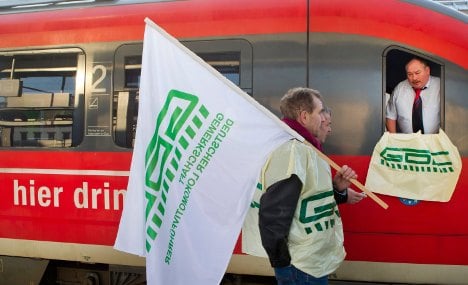Train drivers’ union GDL called the three-hour strike for long-haul and regional train routes between 8:30 am and 11:30 am. It was their third strike in two weeks.
“The GDL once again aims not affect work commuters, and to affect weekend travellers only a bit,” the union said.
As with their strike last Friday, GDL leaders also chose to spare the already struggling S-Bahn commuter train services in Berlin, which have been operating on a limited schedule.
Striking later in the day was a response to widespread anger by train passengers after the GDL’s first strike last week, which prevented many from making it to work on time.
Meanwhile organizer of the technology trade fair CeBIT in Hannover planned to bus international visitors from the airports in Frankfurt, Düsseldorf and Hamburg.
The GDL union has demanded wage increases for some 26,000 regional, long-haul and freight train drivers. They are hoping to get 105 percent of the current average wage at Deutsche Bahn. Many private train companies pay their drivers up to 30 percent less than Deutsche Bahn wage levels.
The union has threatened to shut down the nation’s railways if Deutsche Bahn and six other private train services fail to present an acceptable wage offer.
But on Friday national rail provider Deutsche Bahn called for the GDL to end strikes and return to wage negotiations on Monday, a demand that GDL leader Claus Weselsky rejected.
“The GDL has no strikes planned for the Karneval season, but Deutsche Bahn’s approach requires a clear answer,” he said.
Friday’s temporary strike is scheduled to be the last before the union counts member votes on Monday to decide whether to stage an indefinite strike.
DPA/ka



 Please whitelist us to continue reading.
Please whitelist us to continue reading.
Member comments